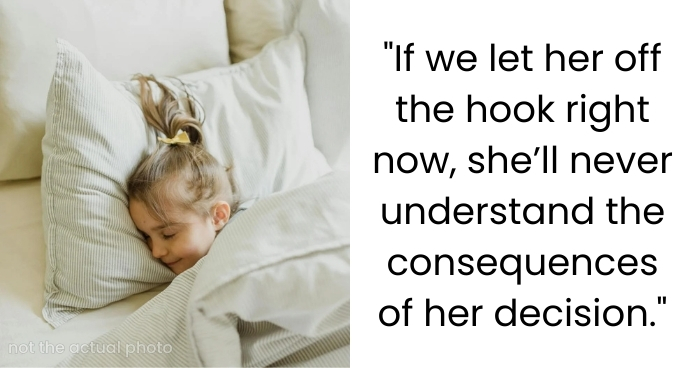‘AITA for teaching my daughter the importance of sleep?’ ‘She HATES bedtime.’
After going to battle with their 7-year-old daughter over sleep on multiple occasions, the Original Poster (OP) came up with a creative plan to educate her on the importance of sleep instead. The kid complained it was not right that she went to bed earlier than the grown-ups, so OP allowed her to stay up as long as she liked, knowing the natural consequences would occur. The child, not surprisingly, went to bed late, had no sleep, and dragged through the subsequent morning of school, swimming class, and homework. OP kept carrying them out even when exhausted, for a hope that the lesson of proper rest would stick.
The child complied with her bedtime plan the next evening. OP and his wife were soundly criticized by some family members (and the wife) for taking such a hard line, borderline neglecting approach, leaving OP open to questioning his parenting. Now, they want a ruling from Reddit if they were in the clear or if they went too far.
Read for more info Reddit










Being a parent can be a difficult gig to navigate — particularly when you are trying to teach your child a life lesson. The natural consequences of bad sleep are a great example of natural consequences parenting, which may be a kinder way to describe the approach of letting your child learn the hard way as opposed to by the wrath of your hand. Supporters say it teaches accountability and a sense of reality. Nevertheless, naysayers caution that it can approach recklessness without balanced control.
The Role of Sleep on Childhood Development
Sleep promotes cognitive development, emotional regulation and physical health for all children. The American Academy of Sleep Medicine recommends that children aged 6–12 get 9–12 hours of sleep each night. Not resting can cause emotional instability, lack of focus and decrease your immune response. The day without much sleep seems to have been seen as invaluable once again, but it could have posed a risk to health if repeated, the risks to the health of the daughter he was probably exposed.
The Psychological Angle
And from a psychological standpoint, OP’s method likely solidified the notion of actions and consequences, which is an important life lesson, right? However, putting her through her paces with her commitments at a time when the evidence is overwhelming she is struggling at the moment certainly has been considered by some to be more a punishment than an educational exercise. Studies found that extremely severe consequences might be suffering for the child, leading to resentment or mistrust of caregivers. Maybe the response should be a little more balanced: directing the child towards acknowledging her mistake while showing her some compassion.
Legal and Ethical Issues
While dramatic, the charges of neglect from some commentators reflect deeper tensions over the difficult boundaries between parenting and malfeasance. While legal definitions of neglect differ, perpetuation of a child safety concern is generally required to deem neglect, as it must threaten a child’s health or development. For example, one day of tiredness ideally from an experiment wouldn’t be neglect by any measure, but chronically prioritizing “hard lessons” over a child’s well-being could cross a line.
Case Study Comparison
Relating example is the well-recorded example of the “tough love nurturing” where children are evoked to make decisions on their own threads while also being held accountable for the result. For example, a school-aged child could not do his or her homework and gets a bad grade. The only difference is severity: when you skip homework, your health isn’t threatened; but when you really lose sleep, your health is. So while OP’s method was tough love-y, the lesson had higher stakes than usual.
Reddit Comments:








When reading the details, OP’s intentions were to teach responsibility and not to inflict harm. They could be a bit too strict even though their method was effective, particularly when they forced the kid do all of the commitments, especially in the case of being clear tired. What we could have found a better middle ground in was first acknowledging her struggle, helping her get through the day, and debriefing after to discuss her choice and consequences.
Verdict: Not the A-hole, one footing short of a confidence trainer Part of the natural consequence of life is that the world is going to teach you things that you need to learn, and one important thing to learn is that all consequences are not negative (in fact, this is what I write about) and one way a consequence is rendered non-negative is by either not happening or being less painful due to some kind of intervention; this is part of what you learn when you are stuck with a person who can bloody control circumstances like God; think about it; and playing with moods is judgmental and high serious—teaching responsibility is important, but so is showing empathy and especially adaptability.

